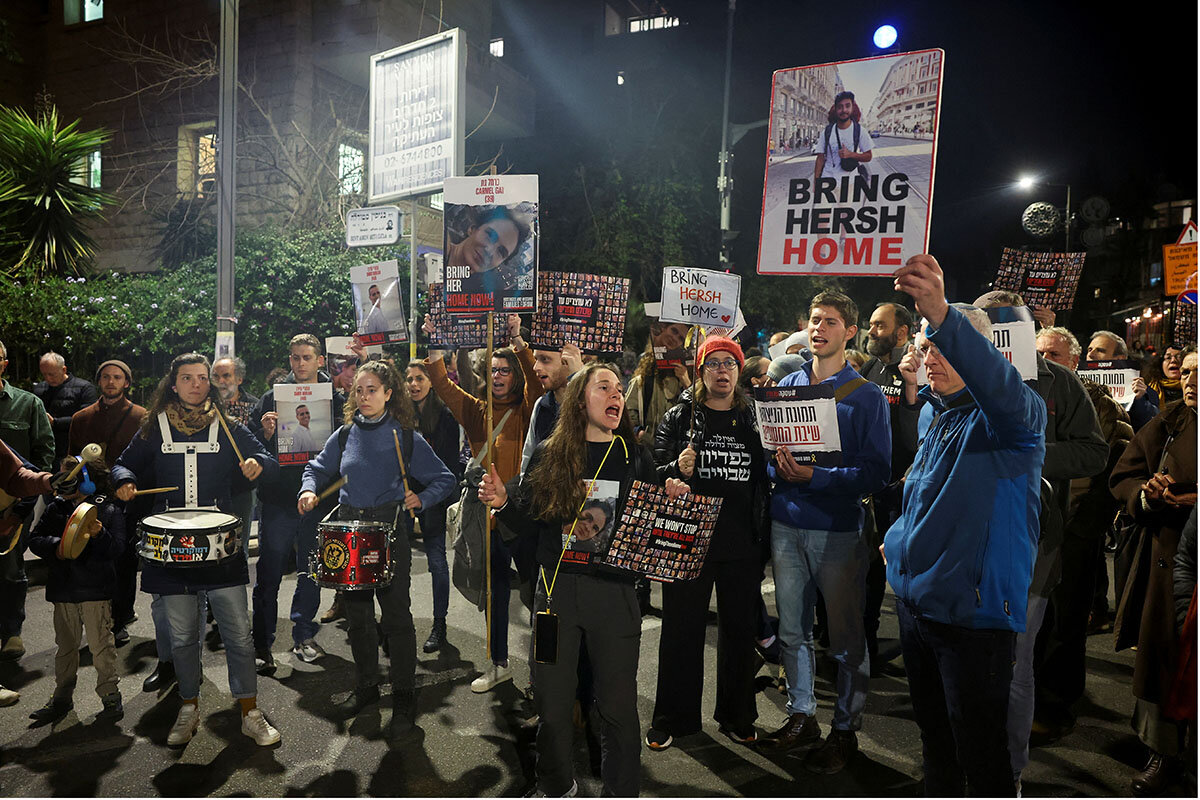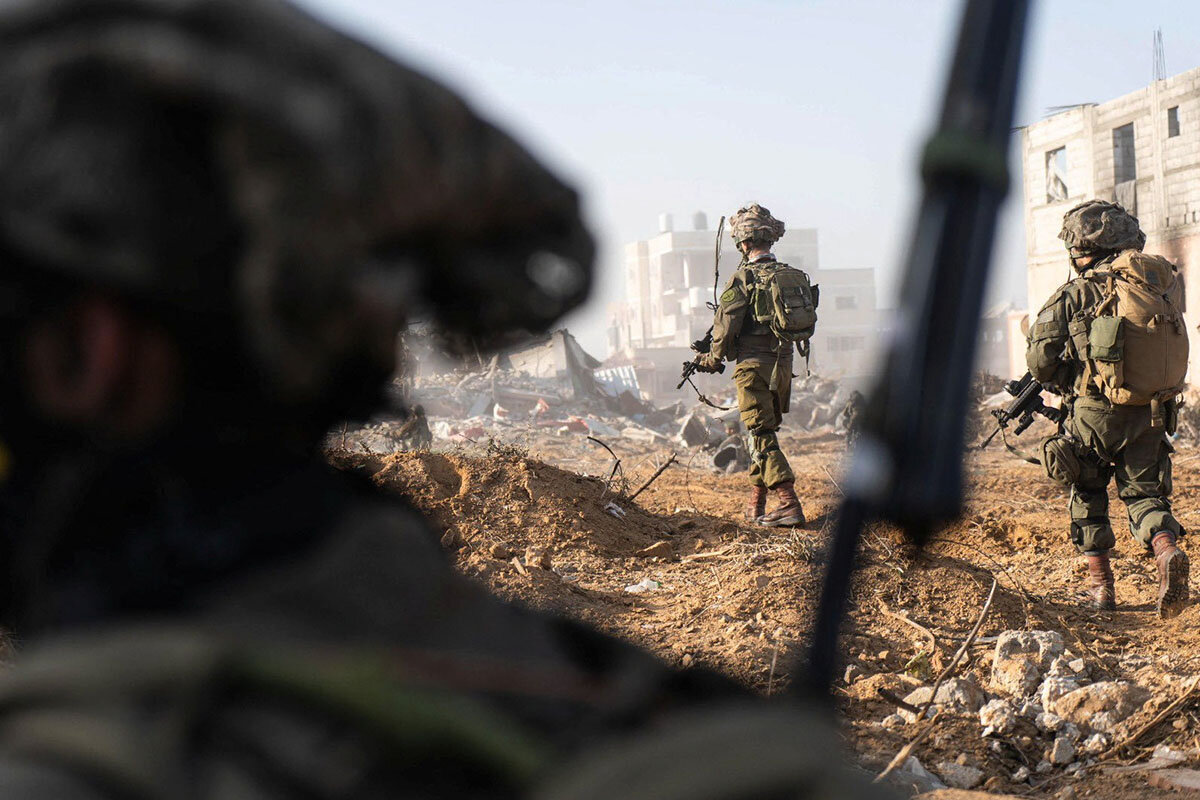Hostages or Hamas? Cracks spread in Israeli unity over war aims.
Loading...
| TEL AVIV, Israel
Mass demonstrations against Prime Minister Benjamin Netanyahu’s government rocked Israel for most of last year, before the outbreak of war.
They are now coming back, albeit smaller and quieter so far, demanding one thing: Secure the release of the remaining Israeli hostages seized by Hamas during its Oct. 7 rampage.
Immediately.
Why We Wrote This
A story focused onFrom the outset, Israel’s twin war goals in Gaza of rescuing hostages and defeating Hamas have been hard to reconcile. As the United States and others try to mediate a new cease-fire/hostage deal with Hamas, do Israelis know what victory looks like?
On a recent cold Saturday night in Tel Aviv, in a main plaza renamed “Hostages Square,” Shira Albag, the mother of 18-year-old captive Liri, addressed a sea of numb and tearful protesters holding placards with the faces of those 136 Israelis still held in Gaza.
“Only if we return all of our hostages home will we be able to feel a sense of victory,” she said. “The hourglass is running out.”
“Now, now, now,” the crowd chanted, directing their anger at the government for not doing enough, and not willing to “pay any price” for the safe return of their loved ones.
Nearly four months into Israel’s retaliatory offensive against Hamas in Gaza, the twin goals set out by Israel – “destroying” the militant organization as the governing and military power in the territory, and releasing all of the hostages – have yet to be achieved.
And for the first time since the start of the war, many in Israel – including opposition politicians and key media figures – have begun to question what victory would even look like.
The hostages, as near-weekly videos released by Hamas have shown, are being held in harsh conditions, and may not survive further time in captivity. Israeli intelligence even believes that Hamas leadership, located deep in underground tunnels below Gaza, is using them as human shields, making elimination of the leadership and rescue of the hostages into incompatible military goals.
Stop “selling fantasies”
The cracks in what had been near universal public unity supporting Israel’s war aims in the conflict’s first few months have even reached the five-person wartime Cabinet tasked with prosecuting the campaign against Hamas.
In a bombshell television interview on Israel’s Channel 12 this month, Gadi Eisenkot, a centrist politician and former military chief who joined Mr. Netanyahu’s wartime coalition in October, said the welfare of the hostages had to take precedence.
The government, he added, needed to stop “selling fantasies” to the public that their release would be achieved through force alone.
“We should say bravely that it is impossible to return the hostages alive in the near future without an agreement [with Hamas],” Mr. Eisenkot said, including countenancing a halt to the fighting for a “significant” period of time as part of any such deal.
Analysts question what “significant” time would actually entail, as Hamas has consistently demanded that any new deal lead to a permanent cease-fire (in addition to the release of possibly thousands of Palestinians from Israeli prisons, many held on serious terror offenses).
Mr. Netanyahu, Defense Minister Yoav Gallant, and the top military brass have so far been consistent: Israel is still striving, as the prime minister continues to insist, for “total victory.” Senior Israeli officials maintain that only military power will lead to the hostages’ release.
"The long-term agreements with Hamas [in the past] had only one reason: They understood that they might pay a military price,” says one senior Israeli military official. “This is the effect of pressure. We need to use military force.” Having only conversations “simply won't work.”
Negotiations in Paris
And yet negotiations in a bid to halt the conflict are exactly what the United States and other mediators are trying to pursue. Over the weekend, Israel’s top two spy chiefs met with CIA Director Bill Burns and senior Egyptian and Qatari officials in Paris for talks over a multistage cease-fire deal that would see the release of the hostages.
A senior Israeli official described the talks as “constructive ... but significant gaps remain” – primarily the question of how to bridge Israel’s purported offer of a two-month truce with Hamas’ continued demand for a full cessation of hostilities and the withdrawal of Israeli forces from Gaza.
Israeli leaders have made clear they intend to continue their offensive on the other side of any stoppage in fighting, similar to the weeklong truce concluded in late November that saw the release of over 100 Israeli hostages and 240 Palestinian prisoners.
Fighting in Gaza resumed almost immediately after the truce collapsed, with Israeli forces now operating in the southern city of Khan Yunis after a large-scale ground incursion that reduced swaths of northern Gaza to rubble.
Analysts question whether Mr. Netanyahu has the political space for any halt to the war, given that his key far-right coalition allies, Finance Minister Bezalel Smotrich and National Security Minister Itamar Ben-Gvir, have opposed any such move.
“In favor of returning the hostages, against an awful deal,” Mr. Ben-Gvir posted last week on X, formerly known as Twitter, amid reports of renewed international mediation.
Yet, similar to Mr. Eisenkot, government critics contend that the moment may have arrived where Israel indeed has to make such a choice.
“The two goals of the war are in conflict,” asserted Maj. Gen. Amos Yadlin, the former head of Israeli military intelligence, in a recent call with reporters. “In the first deal [with Hamas last November] military pressure was necessary. Now it’s not necessarily helping return the hostages.”
Most support continuing war
And yet despite mounting concern from all corners of Israeli society over the plight of the hostages, some 60% of Jewish Israelis would oppose any hostage release deal that required halting the war and releasing all Palestinians held in Israeli prisons, according to a poll published last week by the Israel Democracy Institute.
Mr. Netanyahu himself, in a press conference Saturday, appeared to criticize the hostage families themselves for protesting too loudly, arguing that it “only strengthens Hamas’ demands and pushes the goal [of the hostages’ release] further away.”
The prime minister again reiterated his “commitment to win a total victory,” and lashed out at those “voices of the weak” inside Israel that “are trying to sow doubt, despondency, and pessimism” regarding the country’s ability to do so.
According to one person with knowledge of Mr. Netanyahu’s thinking, he is preparing for upcoming snap elections that are now being anticipated across the political spectrum, as even Mr. Eisenkot hinted in his television interview.
The hostage families, along with the traditional anti-Netanyahu protest groups, have vowed to increase their public demonstrations. They have also begun blocking the main highway just outside Tel Aviv, a move taken straight from last year’s mass protests.
“God willing, together we will win,” Mr. Netanyahu said Saturday night at the close of his press conference, in a wink to the unofficial national tagline for the war that he has arrogated for himself. The growing sense in Israel is that unity, let alone victory, is further away than ever.








